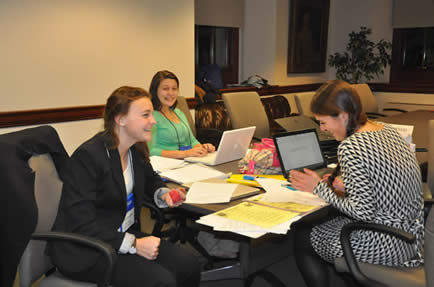
Quick Links |
MEDIA MEMBEROverview
The materials that follow were borrowed from the Minnesota Youth in Government Program media handbook. They have over 1400 participants and have not only a newspaper but also a TV program and a radio station. These materials will assist you as you embark on your media experience. Read these materials and use them throughout the weekend of the program.
Introduction to MediaWelcome to the Media Staff, whether you are one of the Editors, a correspondent or the photographer, you have a very important role in our program. You have a unique opportunity as a part of the media at our program. To observe activities in all the sessions and report you’re on observations to the participants at this year’s program. Those not on the newspaper staff will not be able to see all of the other sessions. Your audience will be your colleagues, advisors, and even beyond our program as we use the newspaper to promote the program to new schools.
Along with the privileged vantage point, the media staff will be responsible:
JOURNALISTIC ETHICS PREAMBLEMembers of the Society of Professional Journalist believe that public enlightenment is the forerunner of justice and the foundation of democracy. The duty of the journalist is to further those ends by seeking truth and providing a fair and comprehensive account of events and issues. Conscientious journalists from all media and specialties strive to serve the public with thoroughness and honesty. Professional integrity is the cornerstone of a journalist's credibility. Members of the Society share a dedication to ethical behavior and adopt this code to declare the Society’s principals and standards of practice.
SEEK THE TRUTH AND REPORT ITJournalists should be honest, fair, and courageous in gathering, reporting, and interpreting information.
Deliberate distortion is never permissible.
Diligently seek out subjects of news stories to give them the opportunity to respond to allegations
Identify sources when feasible. The public is entitled to as much information as possible on
Make certain that headlines, news teases and promotional materials, photos, and quotations do not
NEVER PLAGIARIZETell the story of the diversity and magnitude of the human experience boldly, even when it is unpopular to do so.
Support the open exchange of views, even views they find repugnant.
Give the voice to the voiceless; official and unofficial sources of information can be equally valid.
Distinguish between advocacy and news reporting. Analysis and commentary should be labeled and not misrepresent Ted fact or context.
Recognize a special obligation to ensure that the public’s business is conducted in the open and that government records are open to inspection.
MINIMIZE HARMEthical journalists treat sources, subjects and colleagues as human beings deserving of respect. You should:
Be sensitive when seeking or using interviews or photographs of those affected by tragedy or grief.
Recognize that gathering and reporting information may cause harm or discomfort. Pursuit of the news
Recognize that private people have a greater right to control information about them than do public officials and others who seek power, influence or attention. Only an overriding public need can justify intrusion into anyone’s privacy.
Show good taste. Avoid pandering to lurid curiosity.
ACT INDEPENDENTLYJournalists should be free of obligations to any interests other than the public’s right to know.
You should:
BE ACCOUNTABLEJournalists are accountable to their readers and to each other.
You should:
|







